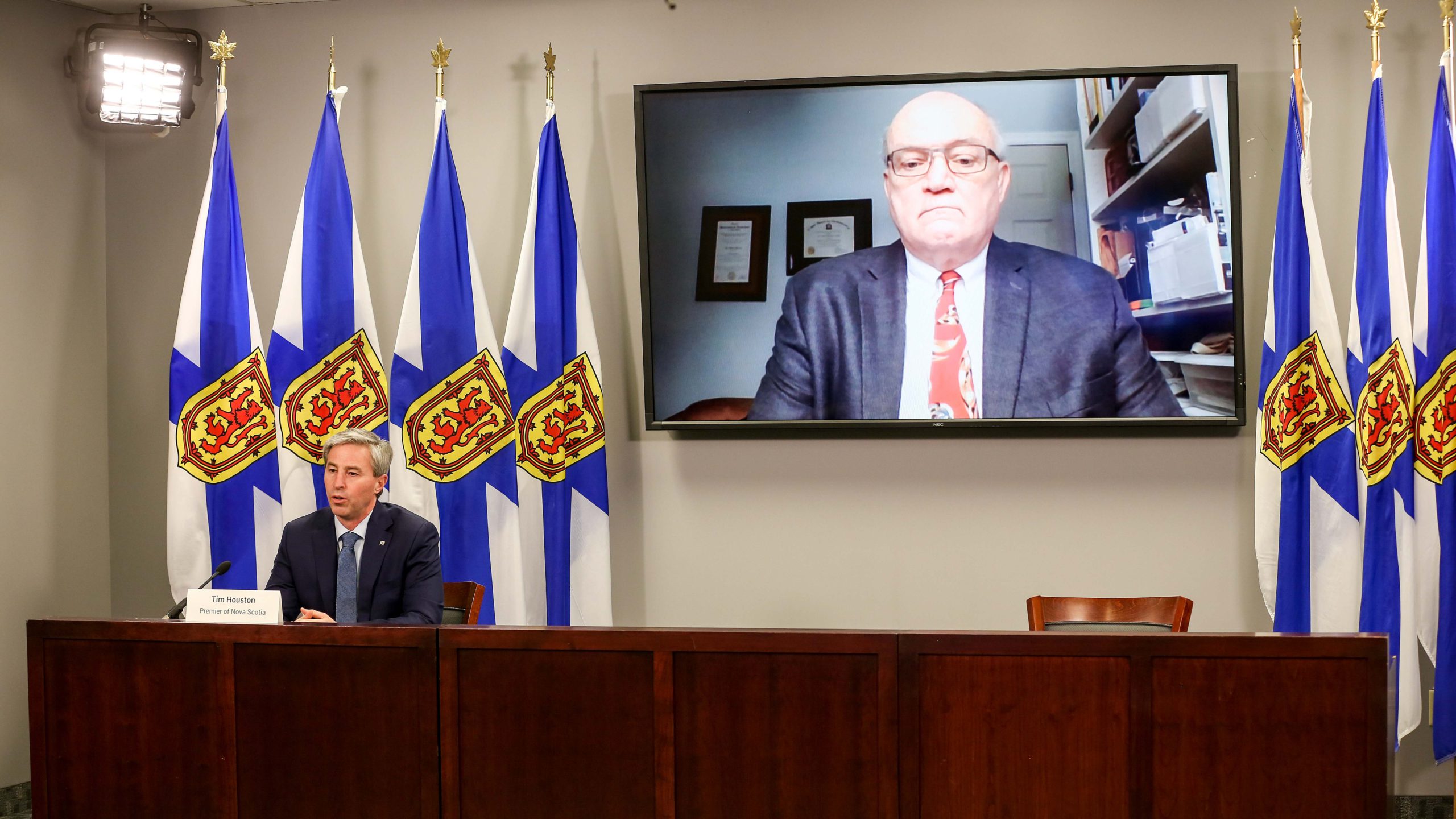Rapid COVID-19 test kits available again soon in Nova Scotia
Three deaths reported; 'COVID is all around us now', says Strang

caption
Dr. Robert Strang and Premier Tim Houston update Nova Scotians on the efforts to combat COVID-19 in the province on Jan. 19.Nova Scotians will soon be able to pick up rapid test kits for COVID-19 in their communities at places like primary assessment centres and libraries, Nova Scotia chief medical officer of health Dr. Robert Strang said on Wednesday.
At a briefing last week, Premier Tim Houston said the province had a decreased amount of rapid tests due to supply chain issues.
“The supplies are coming through,” Strang said at Wednesday’s COVID-19 briefing. He said there would be more to say on this in the coming days.
The province will provide rapid tests to all students and staff in the public school system next week, Strang said.
Students and staff in these schools “will have the option to use these tests up to twice weekly, even if they have no symptoms,” Strang said.
The province reported three deaths due to COVID-19 on Wednesday. A man in his 60s, a man in his 80s and a woman in her 80s all died in the Central Zone. Nova Scotia has reported 14 deaths since Jan. 7, after recording zero deaths in the first week of January.
The Nova Scotia Health Authority reported 527 lab-confirmed cases of COVID-19, which raises the estimated number of active cases in the province to 5,374.
As of Thursday, 83 Nova Scotians are hospitalized due to the Omicron variant of COVID-19, and of that number, six were hospitalized before the current wave. The province reported 11 people were admitted to hospital and five were discharged, and the average hospital stay is 6.5 days.
There are 12 people in intensive care. The average age of those hospitalized is 69, and there are no children in hospital with COVID-19. According to Houston, 20.5 per cent of those hospitalized are unvaccinated.
There are also 66 people who arrived at a hospital for other reasons and tested positive, and 107 people who contracted COVID-19 after being admitted to a hospital.
There are more than 63 cases of COVID-19 in the province’s public schools and school bus routes, according to a database that allows people to self-report cases created by the parent advocacy group Nova Scotia Parents for Public Education. The group created the tool after the province stopped contact tracing in schools.
Strang said at the briefing that contact tracing in schools provides no additional benefit.
“Relying on being notified by government or someone else official about being a close contact, whether in schools or elsewhere, gives people a false sense of security,” he said. “COVID is all around us right now.”
Strang said there’s a possibility Nova Scotians will be exposed to COVID-19 every time they go out. Everyone needs to be cautious and use personal protection measures, he said, as well as monitoring their own health and staying home when they feel sick.
“That’s how we protect each other,” he said.
The province put out a call for healthcare workers not currently in the workforce to fulfill paid positions within the long-term care sector on Thursday. Short-term and long-term positions are available.
Long-term care workers “deserve relief from overtime and cancelled days off, and our loved ones deserve to be served by people who are not stretched beyond their capacity to provide care,” Barbara Adams, minister of seniors and long-term care said in a news release.
On Monday, the province opened an additional 55,000 appointments for the Pfizer COVID-19 vaccine across the province. Houston said at the briefing that 82 per cent of those appointments are already booked.
Houston also announced that 50 per cent of Nova Scotia’s population over the age of 18 has either booked an appointment for a booster or received their shot. The exact breakdown is 39.6 per cent with a dose in their arm and 11.4 per cent who have booked.
About the author
Lane Harrison
Lane Harrison is a fourth-year multimedia journalist from Toronto, Ontario. He works as the editor-in-chief of the Dalhousie Gazette, Dalhousie's...
